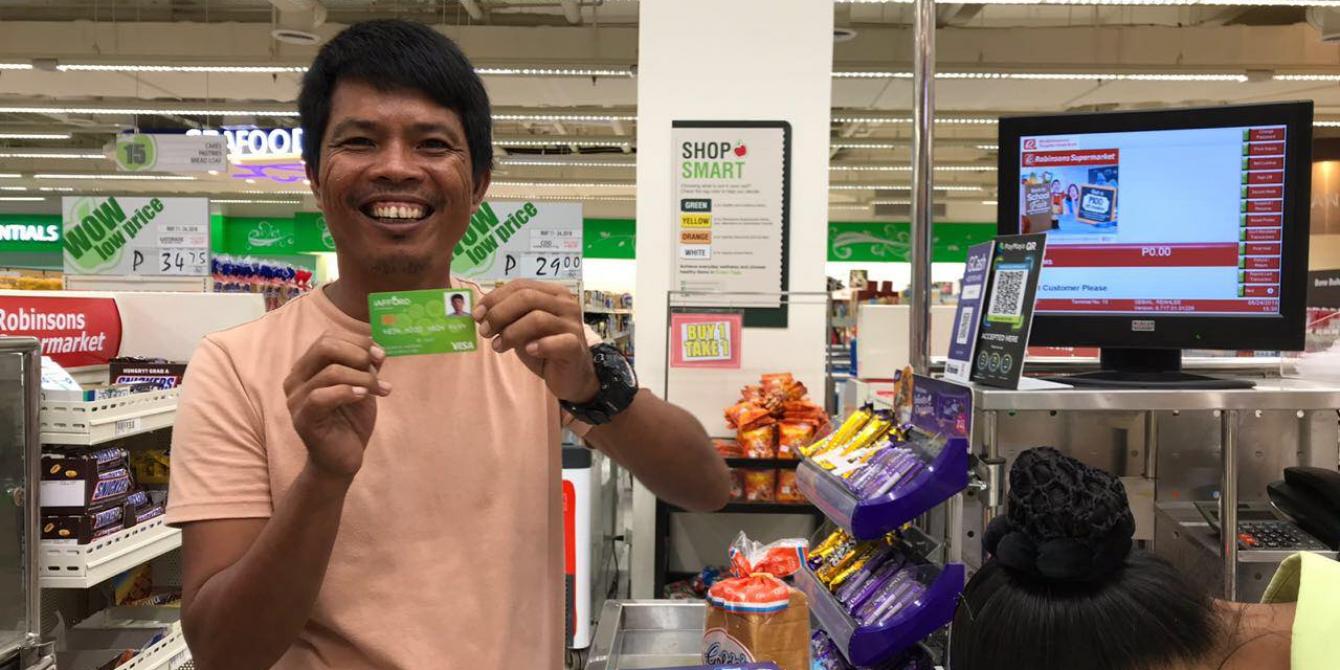
Hassan, a father from Barangay Gadungan in Marawi City, made his first purchase which consists of milk and other food for his baby at a grocery using the iAFFORD PayMaya prepaid card. He qualified as one of the recipients of the cash grant under the Financial Inclusion for the Recovery of Marawi (FIRM) Project. (Photo: Rhoda Avila/Oxfam)
Financial Inclusion an Important Enabler for the Recovery of Marawi
A year after armed conflict broke out in Marawi City, the pursuit of recovery remains a long-term endeavor. Around 230,000 people, who are mostly small traders and vendors, remain displaced and are still struggling to recover their lost properties and livelihoods.
In the Autonomous Region for Muslim Mindanao (ARMM), an estimated 93% of cities and municipalities are unbanked, including Marawi City, which is the region’s center for trade and education. Even the Maranaos, who are known as traders and entrepreneurs across the country, and who have relatively managed to save and invest, are not fully banked.
“With the devastating effects of the conflict on the Maranao economy, it is crucial to provide financial assistance to help affected livelihoods start anew,” said Esteban Masagca, Executive Director of the People’s Disaster Risk Reduction Network (PDRRN).
Gender Snapshot of the Marawi Conflict released by Oxfam early this year revealed that cash and livelihoods are among the most urgent needs of IDPs. They emphasized their need to be able to access capital to fund the small businesses that will help them rebuild their lives.
“Kaming mga Maranao, hindi kami sanay binibigyan ng limos, bigyan lang kami ng kaunting puhunan at kaya namin itong palaguin para makatayong mag-isa” (We Maranaos, we are not used to receiving alms. If you give us capital, we can use that investment and make it grow until we can fend for ourselves), Rosnia Bagonti Gondarangin, a 43-year old sari-sari store owner, said in an interview. Her statement resonates through her fellow IDPs and reflects the strong will of Maranaos to recover from their loss.
Rosnia’s is one of the many testimonies that inspired PDRRN, Oxfam, and the United Nations Development Programme (UNDP) with support from VISA, DFAT Australia, Google Innovation Exchange PayMaya and Smart Padala, to launch the Financial Inclusion for the Recovery of Marawi (FIRM) Project. It aims to provide financial assistance and increase access to and utilization of financial products and services to resume people’s economic activities towards meeting the immediate and long-term needs of the IDPs. It will enroll 15,000 IDP families as prepaid account holders to access future assistance from government and aid agencies.
To safely and quickly disburse financial support to IDPs, and to better ensure access basic needs during the recovery period, the project will issue an IAFFORD PayMaya identification and prepaid card. The card can be used to save money, to purchase food and other items at any Visa and PayMaya accredited stores, for bills payment online and for money transfer at any of the more than 15,000 stations nationwide.
In addition, in order to raise awareness about Islamic finance practices, a forum was held on May 24, 2018 at Zoey Cafe, Iligan City. This was followed by the distribution of iAFFORD cards to IDPs residing in Balo-i, Lanao de Norte. The event aims to share knowledge about the potentials of Islamic finance and showcase first-hand experience of the benefits of the card.
“Supporting communities to recover through financial inclusion enables Marawi conflict-affected families to access the financial support and services they urgently need, and allows them to better manage current and future financial risks and recover from the negative impacts of the crisis,” said Maria Rosario Felizco, Country Director of Oxfam.
For inquiries, please contact: May Anne Caduyac at +09053464586 and makcaduyac@gmail.com

 Follow us on Facebook
Follow us on Facebook Instagram
Instagram Follow us on Twitter
Follow us on Twitter LinkedIn
LinkedIn